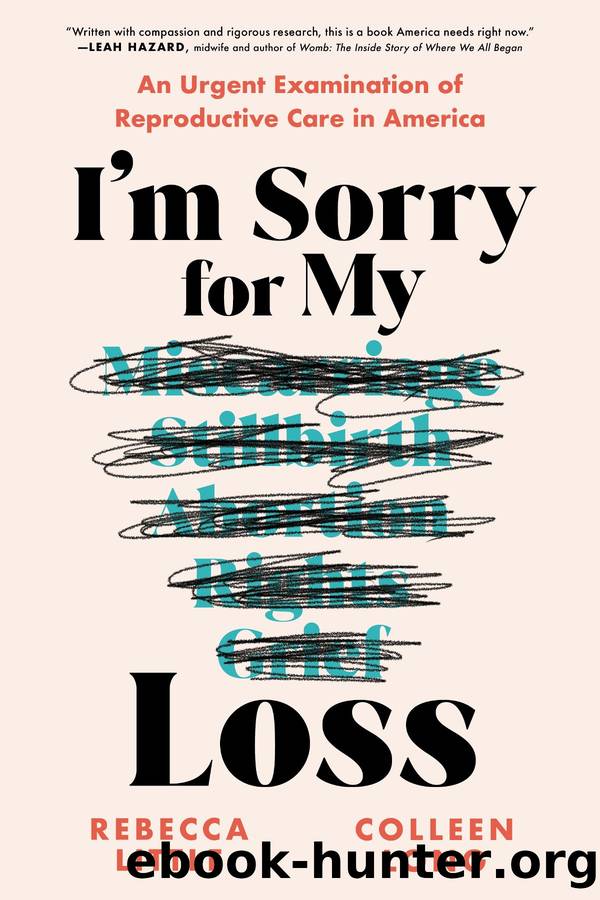I'm Sorry for My Loss by Rebecca Little & Colleen Long

Author:Rebecca Little & Colleen Long [Little, Rebecca & Long, Colleen]
Language: eng
Format: epub
Publisher: Sourcebooks
Drug Use and Pregnancy Loss
There are few studies that identify a direct link between substance abuse and stillbirth, according to a review of medical studies done in 2018 by researchers at the University of Hawaii. Restricted fetal growth was the most common complication in all types of substance abuse, they found.9
Dr. Claire Coles, a professor of psychiatry and behavioral sciences and director of the Maternal Substance Abuse and Child Development program at Emory University in Georgia, has, for more than forty years, studied teratogens, which are substances that cross the placental barrier and interfere with normal fetal development and may cause problems in utero and out. Alcohol is one example; drugs are another, including legal medication. Her program is the data mother ship on what environmental or ingested substances travel from mother to baby. She has a huge body of work, including a recent publication titled âFifty Years of Research on Prenatal Substances: Lessons Learned for the Opioid Epidemic.â10
âItâs interesting,â she told us. âWhen we started with alcohol in 1980, nobody was interested in hearing about this. People have always been sort of aware there are issues there, but they mostly ignored it. There was this (wrong) idea that the placenta would protect the baby from whatever. It was a solid barrier.â11
But it turns out itâs not much of a barrier after all, and most things get into the bloodstream, including drugs (legal and illegal), alcohol, poisons like mercury and lead, and pollutants. But according to Coles, it isnât that teratogen automatically equals infant death. The reality is far more complex, as are the ideas on how to deal with teratogens and perceived teratogens.
âThere are lots of different strings that get involved in this,â she told us. âHow we regard women and pregnancy and all that. If youâre using cocaine, anything wrong with a child must be your fault. Alcohol is more complicated because itâs legal and accepted.â
Coles studied women who were roughly thirty-four weeks pregnant and above and who were serious crack cocaine users. She followed 110 children for more than twenty years. She compared the kids who were exposed to the drug in utero with those who grew up as their neighbors and found very little difference.
This is not to say that sheâor we for that matterâcondone drug use during pregnancy. Children born addicted to substances go through withdrawal and can have lifelong complications, physically, mentally, and emotionally.12 The question is whether thereâs a scientific basis to charge someone with a crime or whether itâs moral panic on the part of the lawmakers. And thereâs no easy way to answer it.
âI think the fear of these things is used to punish women,â Coles said. âGet the law out of it. That is what I believe. On the other hand, I run a clinic in which we see children alcohol- and drug-exposed. The stories we hear would take the paint off the walls. Yes, there are people who shouldnât be having children.â13
âBut itâs a very complex and difficult issue,â she went on.
Download
This site does not store any files on its server. We only index and link to content provided by other sites. Please contact the content providers to delete copyright contents if any and email us, we'll remove relevant links or contents immediately.
Nudge - Improving Decisions about Health, Wealth, and Happiness by Thaler Sunstein(7706)
The Fire Next Time by James Baldwin(5444)
iGen by Jean M. Twenge(5415)
Adulting by Kelly Williams Brown(4574)
The Sports Rules Book by Human Kinetics(4386)
The Hacking of the American Mind by Robert H. Lustig(4383)
The Ethical Slut by Janet W. Hardy(4253)
Captivate by Vanessa Van Edwards(3839)
Mummy Knew by Lisa James(3691)
In a Sunburned Country by Bill Bryson(3542)
The Worm at the Core by Sheldon Solomon(3487)
Ants Among Elephants by Sujatha Gidla(3467)
The 48 laws of power by Robert Greene & Joost Elffers(3291)
Suicide: A Study in Sociology by Emile Durkheim(3022)
The Slow Fix: Solve Problems, Work Smarter, and Live Better In a World Addicted to Speed by Carl Honore(3009)
The Tipping Point by Malcolm Gladwell(2922)
Humans of New York by Brandon Stanton(2873)
Get What's Yours for Medicare: Maximize Your Coverage, Minimize Your Costs by Philip Moeller(2730)
Handbook of Forensic Sociology and Psychology by Stephen J. Morewitz & Mark L. Goldstein(2705)
